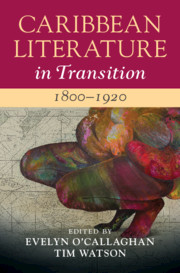Book contents
- Caribbean Literature in Transition, 1800–1920
- Caribbean Literature in Transition
- Caribbean Literature in Transition, 1800–1920
- Copyright page
- Contents
- List of Illustrations
- Contributors
- Acknowledgements
- Introduction
- Part I Literary and Generic Transitions
- Part II Cultural and Political Transitions
- Part III The Caribbean Region in Transition
- Part IV Critical Transitions
- Chapter 22 Creative Rewritings of Early Caribbean Texts
- Chapter 23 Digital Restaging of Early Caribbean Texts
- Chapter 24 Lost Mothers in the Caribbean Plantation and Contemporary Black Maternal and Infant Mortality
- Chapter 25 Reading the Colonial Archive through Joscelyn Gardner’s Creole Portraits I–III
- Bibliography
- Index
Chapter 24 - Lost Mothers in the Caribbean Plantation and Contemporary Black Maternal and Infant Mortality
from Part IV - Critical Transitions
Published online by Cambridge University Press: 16 December 2020
- Caribbean Literature in Transition, 1800–1920
- Caribbean Literature in Transition
- Caribbean Literature in Transition, 1800–1920
- Copyright page
- Contents
- List of Illustrations
- Contributors
- Acknowledgements
- Introduction
- Part I Literary and Generic Transitions
- Part II Cultural and Political Transitions
- Part III The Caribbean Region in Transition
- Part IV Critical Transitions
- Chapter 22 Creative Rewritings of Early Caribbean Texts
- Chapter 23 Digital Restaging of Early Caribbean Texts
- Chapter 24 Lost Mothers in the Caribbean Plantation and Contemporary Black Maternal and Infant Mortality
- Chapter 25 Reading the Colonial Archive through Joscelyn Gardner’s Creole Portraits I–III
- Bibliography
- Index
Summary
Enslaved mothers appear as pastoral figures within depictions of the Caribbean plantation as an imagined idyll in the works of George Robertson and James Hakewill. Yet planters’ journals and histories also emphasize the need for the productive and reproductive labour of enslaved women. This essay examines Caribbean images of enslaved women and their children to trace the ‘past in the present’ (Christina Sharpe) as slavery’s legacies persist in the US. Black women in the US are 243 per cent more likely to die from pregnancy or childbirth-related causes than white women and black babies are twice as likely to die in their first year as white babies. By analysing the range of incompatible discourses that constructed and consumed the slave mother’s body in early Caribbean slavery, this essay exposes the persistence of such devastating discursive forces in the present that have real impacts on the lives of black mothers and their children.
Keywords
- Type
- Chapter
- Information
- Caribbean Literature in Transition, 1800–1920 , pp. 390 - 408Publisher: Cambridge University PressPrint publication year: 2021

